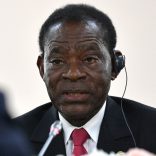At least 15 dead after Lisbon funicular derails
Angola: US-Africa business summit begins in Luanda

File photo: Lusa
The 17th US-Africa Business Summit kicked off yesterday in Luanda at a critical moment in relations between Washington and the African continent, after US President Donald Trump has promoted a series of cuts and hostile measures.
Total trade in goods between the United States (US) and Africa was estimated at US$71.6 billion (€61.9 billion) in 2024, according to US government data.
A strategic rapprochement between Africa and the US was reinforced during the presidency of Joe Biden (2021–2025), who last year made a historic visit to Angola – the first by a sitting US president.
One of Washington’s biggest bets in Africa has been the Lobito Corridor, a railway infrastructure linking Angola to the Democratic Republic of Congo, Zambia and Tanzania, considered by the US, the European Union and their regional partners as a strategic pillar for the transport of critical minerals.
However, Donald Trump’s return to the White House in January 2025 has left African leaders apprehensive about a possible distancing, which is materialising through a combination of executive measures, trade and travel restrictions and public rhetoric.
Earlier this year, Donald Trump’s administration announced massive cuts to various forms of support for the African continent, including the suspension of some United States Agency for International Development (USAID) projects that, among other things, were associated with the Lobito Corridor and aimed at supporting women farmers.
The dismantling of USAID has severely affected the world’s largest human immunodeficiency virus (HIV) treatment programme, with a particular impact on African countries, leading to an increase in unemployment and the closure of clinics.
Analysts have warned that these US cuts in development aid could bring southern African countries, including Angola and Mozambique, closer to China.
In addition to withdrawing support, Donald Trump, who has a very restrictive anti-immigration policy, signed an executive order earlier this month banning travel to the United States from 12 countries, including several African states such as Chad, the Republic of Congo, Equatorial Guinea, Eritrea, Somalia and Sudan, among others.
In an escalation of the crackdown on immigration, a State Department memo released this week by the press shows that this list may include 36 more countries – 25 of them African, including Angola, Cabo Verde and São Tomé and Príncipe.
The memorandum identified several criteria which, in the US government’s assessment, were not being met by these states, such as not having “any competent or cooperative central government authority to produce reliable identity documents or other civil documents” or suffering from “widespread government fraud”.
Added to this are the tariffs imposed by the United States on Africa, with the president of the African Development Bank (AfDB) warning of the economic consequences of these measures.
AfDB President Akinwumi Adesina said last month that 47 of the 54 African countries will be directly affected by this new US trade policy, which will potentially reduce these nations’ export revenues and foreign exchange reserves (foreign currency assets held by a country, controlled by its monetary authority).
Although Africa accounts for about 20% of the world’s population and less than 3% of global gross domestic product (GDP), Adesina pointed out that there is a scenario for growth: ten of the world’s 20 most dynamic economies are in Africa.
From June 22–25, Luanda will host the 17th edition of the US-Africa Business Summit, the most important business forum between the United States and the African continent, with the Lobito Corridor among the topics highlighted.
More than 1,500 participants — including heads of state, prime ministers, African ministers, senior US government officials and business leaders from both continents — are expected in the Angolan capital for this event co-organised by the Corporate Council on Africa (CCA) and the Government of the Republic of Angola.












Leave a Reply
Be the First to Comment!
You must be logged in to post a comment.
You must be logged in to post a comment.